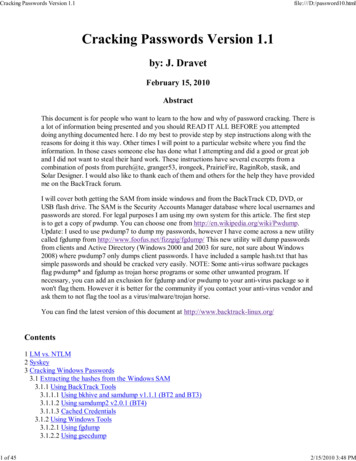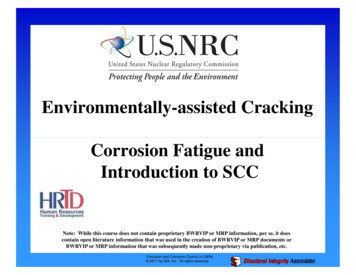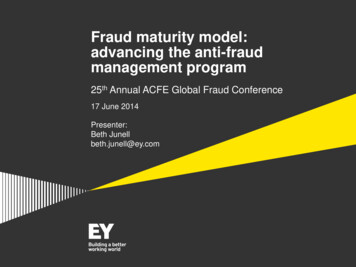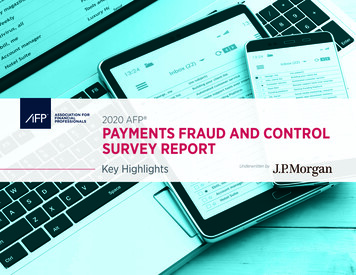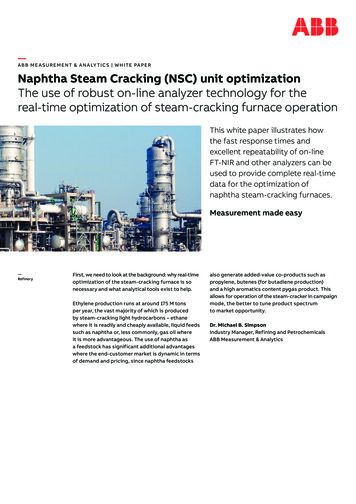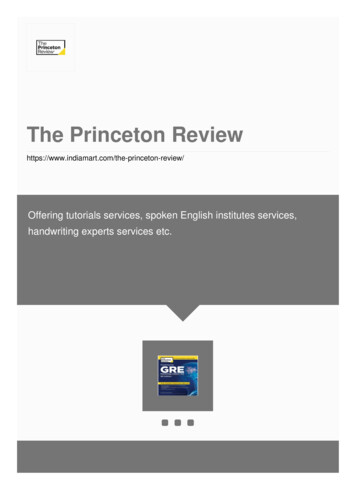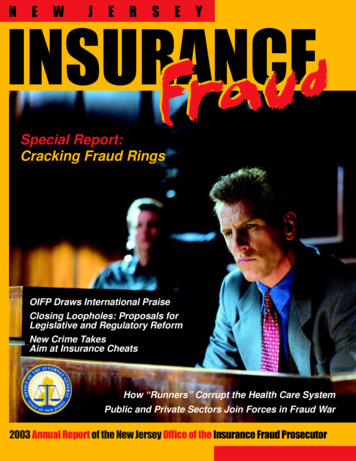
Transcription
NEWJERSEYINSURANCEduFraSpecial Report:Cracking Fraud RingsOIFP Draws International PraiseClosing Loopholes: Proposals forLegislative and Regulatory ReformNew Crime TakesAim at Insurance CheatsHow “Runners” Corrupt the Health Care SystemPublic and Private Sectors Join Forces in Fraud War2003 Annual Report of the New Jersey Office of the Insurance Fraud Prosecutor
How’d they find out? INSURANCE FRAUDIS ASERIOUSCRIME.Don’t Do It. Don’t Tolerate It.CallConfidentially1.877.55.FRAUDNEW JERSEY OFFICE OF INSURANCE FRAUD PROSECUTORInside Front Cover
This pagewas intentionallyleft blank
Annual Report ofThe New JerseyOffice of theInsurance FraudProsecutorAnnual Report StaffJohn J. Smith, Jr.First AssistantInsurance Fraud ProsecutorAssistant Attorney GeneralStephen D. MooreEditorSupervising Deputy Attorney GeneralMelaine CampbellCo-EditorSupervising Deputy Attorney GeneralFeature WritersJohn ButchkoSpecial Assistantfor Calendar Year 2003Norma R. EvansSupervising Deputy Attorney GeneralSubmittedMarch 1, 2004(Pursuant to N.J.S.A. 17:33A-24d)Michael A. MonahanSupervising Deputy Attorney GeneralJohn KrayniakSupervising Deputy Attorney GeneralScott R. PattersonSupervising Deputy Attorney GeneralStephanie StenzelSupervising State InvestigatorContributorsPeter C. HarveyAttorney GeneralVaughn L. McKoyDirector, Division of Criminal JusticeGreta Gooden BrownInsurance Fraud ProsecutorJennifer FradelSupervising Deputy Attorney GeneralCharles JanousekSpecial AssistantBarry T. RileySupervising State InvestigatorPhotographersVincent A. MatulewichManaging Deputy Chief InvestigatorCarlton A. CooperCivil InvestigatorProductionPrepared by:Office of the Attorney GeneralDepartment of Law and Public SafetyDivision of Criminal JusticeOffice of the Insurance Fraud ProsecutorP.O. Box 094Trenton, NJ 08625-0094609-896-8888www.njinsurancefraud.orgPaul KramlArt DirectorSina AdlGraphic DesignerAdministrative andTechnical SupportPaula CarterSusan CedarJoan EnrightPat MillerCynthia RonanLynn WassermanJacqueline Wendel
This pagewas intentionallyleft blank
ContentsMessage FromThe Insurance Fraud Prosecutor5Special Report:OIFP Targets Fraud Rings8OIFP’s Prosecutions ProveCorrupting Influence of “Runners”On Health Care System16Pharmacy Scams Busted byOIFP’s Medicaid Fraud Section26OIFP Draws International Acclaim32Insurance ReformsToughen Fraud Penaltiesand Give OIFP New Tools38OIFP Civil Enforcement ActionsPack a One – Two PunchIn The Fight On Fraud44OIFP’s Public Awareness and InsuranceFraud Training Programs Spread the Wordon Insurance Fraud50
OIFP’s Office Structure,Organization and Operations58Cooperation, Coordinationand Communication Key to OIFP Success64OIFP Funds County Prosecutors’Insurance Fraud Fighting Efforts74Insurance Fraud Case Highlights80OIFP Criminal Case Descriptions – Insurance FFraudraudOIFP Criminal Case Descriptions – Medicaid FFraudraud2003 Medicaid Civil Case SettlementsCounty PProsecutors’rosecutors’ Offices Criminal Case SummariesOIFP Civil Investigations and ActionsOIFP Civil LitigationProfessional Licensing PProceedingsroceedingsClosing the Loopholes on Fraud:OIFP’s Recommendations forLegislative and Regulatory Reform84142150152164170172176
A MessageFrom The Insurance Fraud ProsecutorSowing and Reaping inthe War on Insurance FraudGreta Gooden BrownI am proud to present the fifth Annual Report of the Office of the InsuranceFraud Prosecutor (OIFP) to the Governor and Legislature of the State of New Jersey as required by N.J.S.A. 17:33A-24d. I am pleased to report that, in 2003, wemet our goals and exceeded our expectations. In 2003, OIFP prosecuted morecriminal cases than any other year in OIFP’s history. In addition, we continued tosow the seeds for successful investigations and prosecutions long into the future.Over the past year, New Jersey attained record highs, both in the number ofthose charged with, and those convicted of, committing insurance fraud. In 2003,OIFP, together with OIFP funded County Prosecutors’ Insurance Fraud Units,filed criminal insurance fraud related charges against 730 individuals. We obtainedconvictions against 379 defendants, 109 of whom were sentenced to a total of 194years in prison. OIFP cases, alone, accounted for over 70% of the prison timemeted out to convicted insurance fraud felons.On the civil side, OIFP’s record in 2003 was equally impressive. As reportedin December of 2003 by the Coalition Against Insurance Fraud in its most recentnational insurance fraud survey, the New Jersey Office of the Insurance FraudProsecutor led the nation in the number of civil sanctions imposed, accounting for86% of all civil actions taken in the nation. Moreover, in 2003, all of New Jersey’senforcement efforts resulted in insurance cheats being ordered to pay over 16.5million constituting restitution, criminal fines and civil penalties.While OIFP was conceived, in part, to address New Jersey’s burgeoningauto insurance rates, the savings to New Jersey’s insurance consumer resulting from OIFP’s successful prosecutions cannot be precisely quantified. It is undeniable, however, that by identifying, prosecuting and punishing insurancecheats, OIFP prevents losses of millions of dollars each year. Indeed, some ofthe successful prosecutions highlighted in this Report, particularly with respectto staged accident rings, have resulted in savings of millions of dollars thatwould have otherwise been drained from New Jersey’s insurance systemthrough the submission of fraudulent bodily injury claims alone. Further, OIFPundoubtedly deters countless other potential fraudsters from committing insurance fraud by publicizing its successful prosecutions.The fruits of OIFP’s labor increasingly drew the attention of others in 2003,both here and abroad. OIFP’s accomplishments were the feature story of the December 2003 edition of Fraud International Magazine. In addition, in 2003, OIFPwas selected as a national finalist for the prestigious International Association ofChiefs of Police (IACP) and ChoicePoint Award. The Award recognizes exceptional innovation and excellence in criminal investigations.While we are proud of the official record of our achievements in 2003, we areequally proud of the tireless efforts of our staff who toil daily behind the scenes tolay the groundwork for our present and future successes. Their mandate, whichthey fulfill with uncompromising efficacy, is to be productive while maintaining thehigh quality evidenced in our investigations, prosecutions and programs thathave become our trademark.OIFP’s remarkable progress in its brief five year history may be attributed toseveral factors. The seeds of OIFP’s success were initially sown by the New Jersey Legislature when it created OIFP through the enactment of the Automobilecontinued on next page
Insurance Cost Reduction Act of 1998 (AICRA). AICRA designated OIFP as NewJersey’s lead agency in the war on insurance fraud and provided it with the resources to wage an unrelenting war.In 2003, Governor James E. McGreevey signed into law landmark legislationwhich created the specific crime of insurance fraud and established a reward program for members of the public to provide information leading to the identification, prosecution and conviction of insurance cheats. With this single act, Governor McGreevey has sown the seeds for OIFP’s continued success by increasingthe penalties for committing insurance fraud in New Jersey, solidifying NewJersey’s position as a national leader in combating fraud and enlarging OIFP’sarsenal of weapons in the war against insurance fraud.OIFP’s success may also be attributed to the contributions of our partnersand allies in other law enforcement and public agencies as well as the insuranceindustry. The outstanding contributions of our partners in the law enforcementcommunity and the insurance industry, in particular, enable us to bring to fruitionOIFP’s statutory mission of providing for “a more effective investigation and prosecution of fraud” in New Jersey than existed in the past. Achieving this missioninures to the benefit of New Jersey’s insurance buying public who are the ultimate victims of insurance fraud.Finally, OIFP’s success would not have been possible without the supportand leadership of Attorney General Peter C. Harvey and Assistant Attorney General Vaughn L. McKoy, Director of the Division of Criminal Justice. Attorney General Harvey and Director McKoy are the principal facilitators who enable OIFP toachieve the results for which it was created.We in OIFP recognize and welcome the challenges that lay before us in themonths and years ahead. We will continue in the coming year to conduct thorough investigations, to develop solid cases, to prosecute aggressively and to sowthe seeds for future investigations and prosecutions. We will continue to developeffective anti-fraud programs and initiatives. We will continue to seek new andbetter ways to accomplish our mission, be it the planning of successful sting operations, the tackling of organized insurance fraud rings, or the application of hightech data mining tools to identify new fraudulent patterns or trends. We will continue to spread the word to those who would dare to commit insurance fraud inthe State of New Jersey, that they, too, shall reap what they sow.Respectfully submitted,Greta Gooden BrownNew Jersey Insurance Fraud Prosecutor
OIFP Targets Fraud RingsVehicles recovered by OIFPState Investigators in undercoversting “Operation Give and Go.”8
OIFPTargetsFraud RingsOIFP Criminal Prosecutionsat All-Time Highby Michael A. MonahanIt came in to the Newark Police dispatcher as a frantic 911 call. The callersaid he had just been the victim of acarjacking at the intersection of Williamand Halsey Streets by a man armedwith a gun. Units from the Newark PoliceDepartment were immediately dispatchedto the scene, given the very serious nature of the call. When the police arrivedat the scene moments later, the victimexcitedly described in detail the armedand dangerous carjacker, how he stuckthe gun in the victim’s face, how hetook his car.A witness also volunteered that hehad seen the whole thing, confirmingthe car owner’s story. Despite a diligentsearch, the Newark police could notfind the owner’s car or the carjacker.Later, the owner, a computer programmer for a major corporation, filed atheft claim with his insurance carrier forthe total theft loss and the carrier paidover 16,000 on the claim.Only, there was no carjacking, andthe owner was no victim at all. He wasa thief, who faked the entire carjackingscenario with a friend in order to file afraudulent insurance claim. How didthe authorities know? Because the carhad been in the possession of State Investigators from the Office of the Insurance Fraud Prosecutor (OIFP) for sixfull days at the time the owner reportedthe carjacking, having been purchasedfrom a street-level middleman duringOperation Give and Go, a pro-activeundercover initiative by OIFP to confront the growing problem of owner“give-ups” and stolen automobiles innorthern New Jersey.To conduct the investigation, undercover OIFP investigators gained access to middlemen who traffic in owner“give-ups,” where the owner literally“gives-up” the vehicle to someone elsewith the understanding the vehicle will“disappear,” allowing the owner to file afalse theft claim and fraudulently collect insurance benefits for the alleged9
OIFP Targets Fraud RingsState InvestigatorsMarc Cofoneand Jose Vendasexamine aseized vehicle.What IsBeing Done About Insurance Fraud?The New Jersey Office of the Insurance Fraud Prosecutor (OIFP) leads NewJersey’s fight against insurance fraud. Created by the New Jersey Legislature onMay 19, 1998, pursuant to the provisions of the Automobile Insurance Cost Reduction Act (AICRA), OIFP was established as a law enforcement agency within theDivision of Criminal Justice in the Department of Law and Public Safety to administer a comprehensive and well integrated program to investigate and prosecute insurance fraud as effectively and efficiently as possible. Accordingly, OIFP wasvested under AICRA with authority and responsibility for investigating all types of insurance fraud and for conducting and coordinating criminal, civil and administrativeinvestigations and prosecutions of insurance and Medicaid fraud throughout NewJersey. To provide for the most effective and well integrated statewide strategy possible to combat insurance fraud, OIFP’s authority under AICRA includes responsibility for the oversight of all anti-insurance fraud efforts of law enforcement and otherpublic agencies and departments in New Jersey, as well as appropriate coordination with private industry. Where fraud has occurred, OIFP pursues criminal prosecutions and civil sanctions, including prison sentences, monetary penalties and,in the case of professionals, permanent license revocations. In addition to traditional law enforcement functions, OIFP offers a comprehensive roster of programsto inform the public, train law enforcement officers and marshal resources of thepublic and private sectors to eradicate fraud.10
loss. To lend an air of legitimacy to theoperation, OIFP rented a garage in Jersey City, completely outfitted with toolsand auto parts, where the middlemencould bring the cars to the undercoverOIFP investigators. Unbeknownst towould-be insurance cheats, however,the garage was also fully equippedwith concealed audio and video recorders to memorialize all activity atthe shop. As a result of this initiative,OIFP State Investigators conductingOperation Give and Go recovered 46automobiles and SUVs, with a totalvalue of approximately 1 million, and28 middlemen and “give-up” owners,including the owner and friend whofaked the carjacking, were indicted fortheir roles in the conspiracy and thefts.Operation Give and Go is but oneexample of many exciting and successful investigations conducted byOIFP-Criminal in 2003. Whether cracking a staged motor vehicle theft or accident or arson-for-hire ring, or exposing an unscrupulous health care provider billing an insurance carrier forservices never rendered, or arresting adishonest insurance broker stealingpremium monies, the successes of theinvestigations in OIFP-Criminal weremany and varied. In State v. IrisSalkauski, for instance, 49 defendantswere indicted for staging car accidentsin Camden County and filing fraudulent Personal Injury Protection (PIP)claims totaling 567,940 for fictitious injuries. Undercover law enforcement officers ultimately infiltrated the ring byposing as participants in one of thestaged accidents.The leader of that staged accidentring, Iris Salkauski, attempted to thwartlaw enforcement’s efforts to bring herto justice by fleeing New Jersey aftershe was indicted. As a result,Salkauski was placed on New Jersey’sTen Most Wanted List and was trackeddown to a house in Florida where officers found her cowering in a bedroomWhat IsAuto Insurance Fraud?Auto insurance fraud occurs when a person deceives an insurance providerto collect money to which he is not entitled or to avoid paying the appropriate amount of premiums. Providing false or misleading information in support of a claim, on an insurance application, or in an application for an endorsement or policy renewal constitutes an act of insurance fraud. Submittingany type of false or altered receipts, bills, repair estimates or any inaccuratedocuments to support a loss, expense or injury is insurance fraud. Buying orselling a fake automobile insurance identification insurance card is anotherform of insurance fraud.The most common kinds ofauto insurance fraud in New Jersey include:– Fake or exaggerated injury claims– Phony auto theft claims– Staged accidents– False billing by medical providers– Lying on an application for insurance– Using a fake automobile insurance identification cardIn New Jersey insurance fraud is a serious crime punishable bysignificant criminal and civil penalties including jail time.Here is What You Can DoBe aware. If a car suddenly pulls in front of you, forcing you to follow tooclosely, someone may be setting you up for a staged accident. If you are involved in an accident, call the police. Record the license plate, driver’s license number, insurance information and identities of all involved, includingpassengers and witnesses. Beware of unsolicited offers from one or morestrangers who may contact you after an accident recommending a medicalprovider or an attorney. This unsolicited help could be the work of a fraud ring.If you think you are a victim of fraud, immediately contact your insurance company and the New Jersey Office of the Insurance Fraud Prosecutor.11
apprehendedOIFP Targets Fraud Rings12Attorney General Peter C. Harveyannounces that Iris Salkauski, indicted leader of a “staged accident”insurance fraud ring, is one of theDivision of Criminal Justice’s “MostWanted” fugitives. The ”Apprehended” designation in theSalkauski “Wanted Poster” tells therest of the story. Within weeks ofher indictment, Salkauski was apprehended, hiding in a closet insidea Florida residence. Salkauski’s arrest was secured through the effortsof the New Jersey/New York Fugitive Task Force, an unprecedentedlaw enforcement initiative, spearheaded by the New Jersey Divisionof Criminal Justice, which combinesthe resources, intelligence gatheringcapabilities, investigative information and expertise of 50 law enforcement agencies and more than150 federal, state, county and locallaw enforcement officers.
closet. Upon her return to New Jersey,this time with an OIFP-Criminal escort,she pled guilty and was sentenced onNovember 14, 2003, to five years inState prison for her crimes. Most of theother defendants in the case have alsopled guilty and have been sentenced toterms of imprisonment or probation.OIFP-Criminal investigations alsotargeted arson-for-hire rings in 2003with great success. By way of example,in State v. Rossi, OIFP investigatorscracked an arson-for-hire ring in Mercer County responsible for at least sixarson fires which were set in residences or businesses for the purposeof collecting insurance money. MarcRossi, the ringleader and owner of aninsurance claims adjusting service,pled guilty to conspiracy to commit arson, theft by deception and othercharges. In pleading guilty, Rossi admitted to either planning or participating in setting the fires which resulted invarious insurance carriers paying outover 530,000 in property damageclaims. Under the terms of his pleaagreement, Rossi faces ten years inprison and must make full restitution tothe insurance carriers for his role in thescheme. All of the other participants inthe arson-for-hire conspiracy have alsopled guilty, including three who weresentenced to State prison and threemore who were sentenced to probation.In 2003, OIFP-Criminal investigations also targeted dishonest healthcare providers. In State v. Tsilionis, forexample, OIFP-Criminal indictedGeorge and Lisa Tsilionis, husbandand wife chiropractors, charging themwith conspiracy, health care claimsfraud and money laundering for orchestrating an alleged insurance fraudscheme which billed dozens of insurance carriers more than 1.2 million forphony chiropractic “treatments” orother services that were never provided. To perpetrate the fraud, OIFPCriminal alleged that, over a three yearWhat IsHealth Insurance Fraud?Health insurance fraud occurs when a person deceives a health coverage providerin order to collect money to which he is not entitled, to avoid paying the appropriateamount of premiums or to obtain coverage for which he is not eligible. Providingfalse or misleading information about being an employee or a member of aunion or other group to pay lower premiums, concealing a pre– existing medicalcondition at the time of application or submitting any type of false medical bill,receipt, diagnosis, treatment or service to a health insurance provider is healthinsurance fraud.The most common kinds of health insurance fraudin New Jersey include:Provider Fraud– Billing for services not provided– Billing for more expensive services than were provided (known as “Upcoding”)– Billing for separate procedures which must be billed collectively (known as“Unbundling”)– Providing treatments or services which were not medically necessary– Billing an insurer for services which the patient believes are free or complimentary– Billing for services rendered beyond the scope of a provider’s licensePatient Fraud– Submitting claims for services or treatments not provided– Submitting altered or forged receipts for reimbursement– Having a medical provider misrepresent diagnosis or treatment to pay for somethingwhich is not covered– Lying about residency to obtain or to keep New Jersey health insuranceBusiness Fraud– Creating a fake group or organization to obtain less expensive group coverage– Adding family members or other individuals who are not employees or members ofa group to a group policyWhat Does It Cost?Health Insurance Fraud costs Americans 54* billion a year and accountsfor up to 10% of the annual expenditure on health care in the U.S. Studies also showthat for every 1% rise in insurance premiums approximately 400,000* more peoplenationwide will not be able to afford health insurance.* National Health Care Anti-Fraud AssociationHere’s What You Can DoAlways review the Explanations of Benefits you receive from your health coveragecarrier. The EOB reflects bills submitted by your medical provider for services andtreatments which you have received and states what was paid to the provider.Always verify that the charges accurately reflect the correct treatments, services,dates and medical equipment provided. If something doesn’t seem right or you haveany questions, call your health coverage provider.13
OIFP Targets Fraud Ringsperiod, the chiropractors regularly submitted insurance claims supported byfalsified chiropractic treatment recordsand diagnostic testing results, resultingin the carriers paying over 430,000 fornon-existent treatments and services.The case is pending trial.Dishonest insurance brokers alsokept OIFP-Criminal busy in 2003. InState v. Robert Massa, the defendant,an insurance agent, was sentenced toa five year jail term for his role in acomplex scheme to fraudulently obtaininsurance premium finance monies inexcess of 5 million from various finance companies. In State v. DouglasRoss, the defendant stole over 140,000 of his clients’ insurance premiums. Ross pled guilty and was sentenced to probation but also served396 days in jail for his crimes. In Statev. Odell Coleman, the defendant wassentenced to four years in State prisonfor stealing more than 100,000 in in-surance premium money from an elderlyclient. In State v. Robinson Barleycorn,the defendant pled guilty to the theft ofmore than 300,000 in insurance premiums from his client, a tugboat company.Barleycorn was sentenced to probationbut also served ten months in jail for thetheft. In State v. Harry DelBosco, the defendant pled guilty to the theft of 887,000 of his clients’ insurance premiums and was sentenced to five years inState prison.All in all, the types of cases investigated by OIFP-Criminal are limited onlyby the imaginations of the criminals involved. The case of State v. DaoudaTraore is another good example of thelengths to which a thief will go to stealinsurance proceeds. In that case, thedefendant filed claims for death benefitsof more than 400,000 under severallife insurance policies claiming thedeaths of his wife and son in a car accident in Africa. To support his claim,Criminal Convictions204Number of 0022003
Number of Individuals ChargedIndividuals Charged Criminally By Indictment or 03YearTraore submitted hospital records,death certificates and police reports.However, an investigation revealed thedocuments were fictitious, and so, too,were his wife and son. When confronted, Traore admitted he created his“wife” and “son” out of whole cloth forthe sole purpose of fraudulently obtaining life insurance benefits. Following aninvestigation by OIFP-Criminal, Traorepled guilty to theft by deception and wassentenced to a term of probation.These are but a few of the hundredsof successful insurance cases broughtby OIFP against insurance cheats in2003. These and many other casesbrought by OIFP in 2003 are discussedat greater length in the Insurance FraudCase Highlights Section of this Report.Overall, 2003 was an unequivocalsuccess for OIFP-Criminal, with increases over previous years across theboard, from the number of indictmentsreturned, to the number of defendantscharged and convicted, to the amount ofrestitution recovered for the victims of insurance fraud and related crimes. Thistrend is expected to continue, leading tosimilarly stellar results, based on the tireless efforts of OIFP-Criminal investigatorsand attorneys, and the ofttimes seemingly endless parade of greedy and corrupt defendants which OIFP doggedlypursues.Michael A. Monahan is a Deputy AttorneyGeneral in the Office of the Insurance FraudProsecutor where he has served as the Assistant Section Chief of the Auto Fraud Section since 1999. He previously served as anAssistant Prosecutor with the Union CountyProsecutor’s Office for seven years.15
OIFP Prosecutions Prove CorruptingInfluence of “Runners” on Health Care System
OIFP’sProsecutions ProveCorrupting Influenceof “Runners”on Health Care Systemby John JJ. SmithSmith,, JrJr.Since your automobile accidentlast month, you have been treating witha medical provider around the cornerfrom your home. While you are waitingto be taken back to a treatment room,the provider’s phone rings and youoverhear an exchange between theprovider and a woman on the otherend of a speaker phone:Doctor:Woman:As your treatment concludes andyou leave the provider’s office, awoman, whom you assume to be another patient, is entering the office. Yougo about your business for the rest ofthe day, and don’t give a secondthought to either the odd snippet ofconversation you overheard or to theperson who entered the provider’s office as you departed.Unbeknownst to you, however, thewoman who entered the provider’s office as you left, is the same personwhose voice was on the other end ofWe’re playing phone tag.Doctor:Listen, why don’t you send that patientin and I’ll talk to you later in person.Woman:Okay, my love.Doctor:I’ll definitely be in.Woman:I’m sending two in, ok?Oh, you’re a sweetheart.Woman:Ok.Doctor:Thank you very much for thinkingabout us.17
OIFP Prosecutions Prove CorruptingInfluence of “Runners” on Health Care Systemthe speaker phone as you awaitedtreatment. Now, in your absence, theirconversation continues:Woman:Woman:Doctor:How you doing, sweetheart?Doctor:I thought you lost me and didn’t loveme anymore.Woman:How are things? Good?Doctor:How you doing? You look good. Thankyou for referring those patients in. I appreciate that. Were they both in thesame accident or separate ones?Woman:No, same one.Doctor:We can send them to an attorney,alright?.Just give me a couple ofweeks and I will.Woman:Three fifty each?Woman:Yep.Doctor:First of all V. is not coming in.Woman:M. said Friday was the last day hecame in.Doctor:Yeah, he came. He says there’s nothing wrong. We can’t, we can’t do it.We’ll end up in jail if we do. The newdays with insurance companies, tellsus, they say, what’s wrong with the patient. The patient says there is nothingwrong with them. We don’t, we can’t,we can’t do that.Woman:Even with the attorney?And he’s saying there is nothing wrongwith him?Doctor:Doctor:Even with the attorney. It’s different, it’sdifferent, it’s different with all the precert [Pre-Certifications].So I owe youtwo and?Woman:No, you said to me three, you were going [to] give me one and two later.Doctor:It’s two fifty, that’s all I have in mypocket right now.Woman:You owe me!Doctor:I owe you fifty.18Ok, you owe me fifty and three fifty foreach of the guys.Yeah, he hasn’t been in here since. Hecame in four times; he came in tentimes and he has not been here since,since last month. I can’t, I’m gonnalose money on that. There’s no way hemakes three fifty on that. The other onelooks good, coming in frequently, buthe’s on vacation in Puerto Rico.Woman:Let me ask you something, suppose Italk to V.?Doctor:It’s not gonna work, you see, it’sthe new stuff, the new stuff. It’s notlike usual.
Woman:Woman:No, I know. I know.Que stupido, uh! How the hell does heexpect to get a lawsuit? Stupid.Doctor:Before you just walk in, write yourname, and get out. Now it’s all precertification. The insurance companiesinvestigate everything. They spend alot of money, the doctors examine every patient.But, you know, I tell thedoctor whatever the patient says that’sit. I try not to treat the patient anymoreif he says there’s nothing wrong withhim. You know why?Woman:I know, my doctor used to tell me,“Hey, he said nothing hurts.” I said, “I’lltake care of him.”Doctor:But listen, I can’t give you three fifty forevery f ing patient, you knowthat?.When he comes back the nexttime, the insurance companies, we tryto get them in two times a week, actually, yeah, the insurance company willtreat him one more time and that’s it.As per.they tell us how to treat themand we can’t. We have to pretend everybody is an investigator that walksthrough the door.Woman:Oh, yeah, definitely.Doctor:Doctor:I don’t want my name on the front pageof The Star Ledger and that’s what’sgonna happen now. They call it fraud.Fraud is very serious and you knowwhat, when the f ing police comethrough the f ing door, he’ll be talkinglike a parrot about you and me.Before, before I made money. Nowwe’re just trying to make things work;we’re just trying to pay bills. It’s different, it’s different.Woman:Doctor:Who?Doctor:Woman:Ok.And I have other doctors too, thatwe have.If
the penalties for committing insurance fraud in New Jersey, solidifying New Jersey's position as a national leader in combating fraud and enlarging OIFP's arsenal of weapons in the war against insurance fraud. OIFP's success may also be attributed to the contributions of our partners
